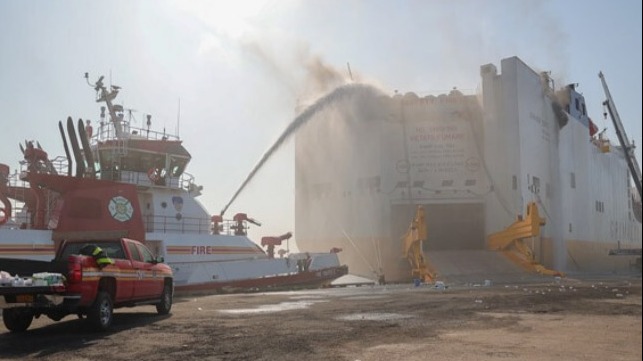Grimaldi Cites Truck Loading Cargo as Cause of Fatal Conro Fire

Grimaldi provided the first insights into the devastating fire aboard its conro in Port Newark as part of a legal maneuver to limit liability and to exonerate the company for the fire that took the lives of two local firefighters and resulted in extensive damage to the vessel Grande Costa D’Avorio. The court filing details the series of events citing a truck used to load cars as the cause of the fire and the actions early in the efforts contributing to the spread of the fire.
“A fire started from the underside of the Jeep Wrangler while it was being driven by an American Marine Services employee and pushing a non-running Toyota Venza from the terminal to Deck 10 on the vessel,” Grimaldi contends in its filing dated September 13 with the U.S. District Court for New Jersey. The Italian shipping company is saying that the vehicle was operated by the stevedoring company which also had the maintenance responsibility for the vehicle and that the AMS drivers and lashers immediately left the vessel when the fire began.
The Grande Costa D’Avorio, a 47,232 gross ton conro had arrived in Port Newark, New Jersey on July 3 coming from Baltimore, Maryland. The vessel was carrying approximately 1,200 new and used cars as well as containers and was completing the loading of cars when the fire began at 21:00 hours on July 5. The 2007 Jeep Wrangler was being used by the stevedoring company to load the vehicles.
The captain and crew of the vessel they report attempted to put the fire out using fire extinguishers and water hoses, but the fire grew in intensity. The heavy smoke forced the crew to leave Deck 10 and then the captain and crew activated the CO2 system in an attempt to suppress the fire. The captain also ordered the fire teams to spray water on Decks 11 and 12 to boundary cool the area above the fire.
The Newark Fire Department reported receiving the call about the fire around 21:30 and joined the firefight. Grimaldi says that its crew then cooperated with and assisted the firefighters as requested and followed their instructions. At some point, the fire department determined that first one of its members and then a second was missing and turned to a search and rescue mission.
“At the request of the firefighters, the captain turned on the vessel’s ventilation system and opened the dampers to clear the smoke from Deck 10 to allow them to search for the missing firefighters,” the filing details. When the two missing firefighters were recovered, Grimaldi says the firefights left the vessel and their crew continued on their own to fight the fire.
It was a 06:00 the following morning that the crew observed the fire spreading on the open Deck 12. For the safety of the crew, Grimaldi says the captain ordered the crew to disembark. The New York Fire Department and a private salvage company took over the effort containing the fire to the aft 300 feet of the 692-foot vessel, but the fire would not be declared out until July 11.
Grimaldi’s version of the events comes as the U.S. Coast Guard says the investigation is still ongoing and has not released its report. The shipping company however is beginning a preemptive legal move contending that the fire “was not caused or contributed to by any fault, neglect, or want of care or design on the part of the vessel or those in charge of her, or by Grimaldi.”
The company is using a federal statute and an admiralty and maritime claim in an effort to ask the court for a limitation of liability while it also seeks exoneration from the liability. The families of the two firefighters have already filed claims and the terminal operator Ports America has served notice of intent to make a claim, but the filing admits that the total amount of the claims which may be made in the future is not presently known.
“Grimaldi reasonably anticipates and believes that civil action and claims will be asserted against it in an amount exceeding the total amount for which Grimaldi and the vessel may be legally responsible,” the filing contends.
The company provided an initial $20 million security on September 1 after the filing by the families of the firefighters, which the company now seeks to reduce to just over $19.8 million. However, citing the admiralty law they are asking the court to limit the liability to $15.9 million.
The amount is based on a calculation that the vessel was valued at $55 million before July 5. Grimaldi is estimating repair costs at $26 million and towing the vessel back to the Mediterranean at an additional $3 million. Further, they expect their share of the salvage cost will be around $11 million. Under the Shipowner’s Limitation of Liability Act, those costs are subtracted from the value of the vessel while $900,000 in owned freight from the shippers of the cargo is added into the calculation to arrive at the $15.9 million figure.

that matters most
Get the latest maritime news delivered to your inbox daily.
In addition to asking the court to exonerate Grimaldi or approve the $15.9 million limitation, they ask the court to set a deadline for filing claims and to prevent future suits except for actions to recover damages or with respect to injury, death, loss, and damage from the casualty.
It is likely the beginning of a long legal process to settle the claims for this casualty. The U.S. Coast Guard has not indicated a timeline for when it might issue its report on the cause of the fire.
